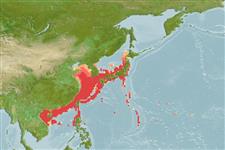Common names from other countries
Environment: milieu / climate zone / depth range / distribution range
Οικολογία
Θαλασσινό(ά); Γλυκού νερού; Υφάλμυρο βενθικό(ς); κατάδρομος (Ref. 51243); εύρος βάθους 1 - 400 m (Ref. 6898). Subtropical; 4°C - 27°C (Ref. 12468); 46°N - 15°N, 105°E - 170°E
Asia: Japan to the East China Sea, Taiwan, Korea, China and northern Philippines. Spawning grounds of this species are presumed to be in the western Mariana Islands, at a salinity front near 15°N and 140°E (Ref. 54488). Most expensive food fish in Japan. Introduced elsewhere.
Μέγεθος / Βάρος / Age
Maturity: Lm ? range ? - ? cm
Max length : 150 cm TL αρσενικό/απροσδιόριστο; (Ref. 9828); common length : 40.0 cm SL αρσενικό/απροσδιόριστο; (Ref. 35840); μεγ. δημοσιευμένο βάρος: 1.9 kg (Ref. 82795)
Σπόνδυλοι: 114 - 118. Plain-colored.
Spawning occurs in the sea; small eels ascend the rivers in schools; develop and grow in freshwater. The species may crawl over land at night from one place to another (Ref. 5258, 11230). Adults feed on crustaceans, insects and fish (Ref. 5258). Maximum weight given (1889 g) has a maximum length of 100.8 cm TL in Ref. 82795. Utilized fresh, smoked, canned and frozen; eaten steamed, broiled and baked (Ref. 9988). Used in Chinese medicine (Ref. 12166).
Life cycle and mating behavior
Maturities | Αναπαραγωγή | Spawnings | Egg(s) | Fecundities | Προνύμφες
Assuming reproductive mode to be the same as that of Anguilla anguilla.
Masuda, H., K. Amaoka, C. Araga, T. Uyeno and T. Yoshino, 1984. The fishes of the Japanese Archipelago. Vol. 1. Tokai University Press, Tokyo, Japan. 437 p. (text). (Ref. 559)
IUCN Red List Status (Ref. 130435)
CITES (Ref. 128078)
Not Evaluated
Threat to humans
Harmless
Human uses
αλιεία: πολύ εμπορικό; Υδατοκαλλιέργειες: Εμπορικό(ά)
Εργαλεία
Special reports
Download XML
Διαδικτυακές πηγές
Estimates based on models
Preferred temperature (Ref.
115969): 2.5 - 23.3, mean 17 (based on 432 cells).
Phylogenetic diversity index (Ref.
82804): PD
50 = 0.5000 [Uniqueness, from 0.5 = low to 2.0 = high].
Bayesian length-weight: a=0.00062 (0.00039 - 0.00099), b=3.18 (3.05 - 3.31), in cm Total Length, based on LWR estimates for this species & Genus-body shape (Ref.
93245).
Τροφικό Επίπεδο (Ref.
69278): 3.6 ±0.51 se; based on food items.
Ελαστικότητα (Ref.
120179): Χαμηλό, ελάχιστος χρόνος για διπλασιασμό πληθυσμού 4,5 - 14 έτη (K=0.07).
Fishing Vulnerability (Ref.
59153): High to very high vulnerability (71 of 100).
